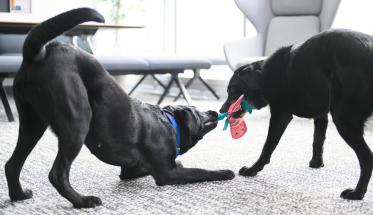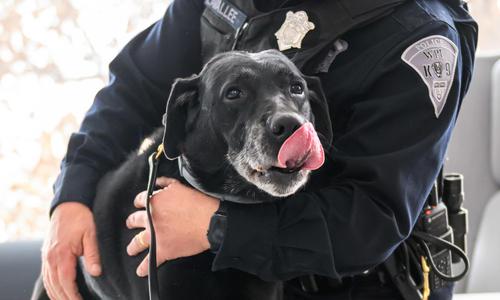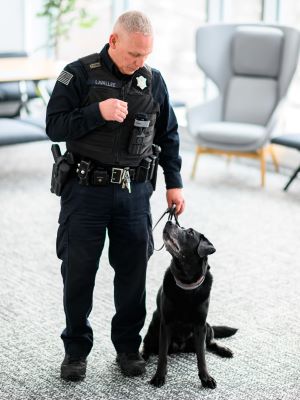Ordinarily, when a member of the WPI Police Department retires, they don’t keep coming to campus several days a week. They also don’t often get the chance to help train their successor. And they never, ever play tug of war with the new hire.
K-9 Bella, though, isn’t an ordinary member of the police squad. In fact, this 9-year-old black Labrador Retriever—and what she’s given the WPI community over the years—is pretty extraordinary.
A certified explosive-sniffing dog, Bella works in the background before, during, and after large events to make sure the area is safe. She has been at the side of her handler, Officer Brian Lavallee, since June 2016, when WPI became the first college in Massachusetts to have an explosive detection K-9 unit.
When Bella retires this spring, K-9 Jewel—who began her explosive-detection training last month—is poised to take the reins. Or leash, if you will. But Lavallee plans to continue bringing Bella to campus when he can.
“I’ll still do training with her and keep her active because I don’t want Bella to fall into a depression,” Lavallee says. “She’s been working hard for almost eight years and she enjoys it. To her, the work is a game of hide and seek.”
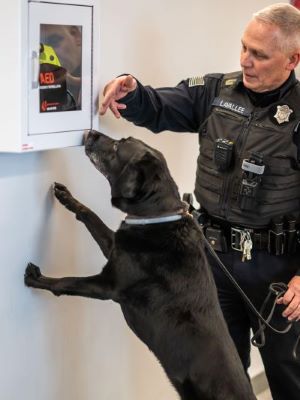
Bella sniffing a defibrillator device
Both Bella and Jewel came to WPI via Guiding Eyes for the Blind. They spent the first year and a half of their lives in a household setting with puppy raisers who socialized them and provided basic obedience training. Dogs who are especially curious and highly motivated by food, like Bella and Jewel are, become candidates for police work instead of finishing the service dog program.
Prior to 2016, WPI relied on Massachusetts State Police dogs to work at large campus events such as Commencement, move-in day, and national robotics competitions. There was no guarantee that other dogs would be available when WPI needed them, though, so Sgt. Michael Jacobs talked to university leadership about starting a K-9 unit here.
Since Bella first earned her New England State Police Administrators Conference (NESPAC) certification, she and Lavallee have conducted security sweeps at more than 750 campus events and responded to about 30 suspicious package reports.
“With Bella’s explosive-detection abilities, we can very quickly get a sense of whether there’s a real concern in an area,” says Chief Steve Marsh.
Of course, you can’t identify every potential safety threat with a dog, Jacobs notes. “But having Bella has been the easiest way that we can help render this campus safe. What a bomb-detection canine can bring to the university is unmatched by anything else,” he says. “Plus, Bella has done a great job humanizing us and making our officers a little more approachable.”
In fact, community outreach has been a central part of Bella’s duties. She and Lavallee have participated in nearly 900 small-scale campus events, including student safety talks and meet-and-greet sessions with prospective students. Over the years she has also been called dozens of times to help other law enforcement agencies with security sweeps and investigations. She and Lavallee have patrolled at large public events like the Boston Marathon and the Fourth of July celebration at Boston’s Esplanade.
But the WPI campus is Bella’s happy place. Likewise, she sheds a trail of smiles wherever she goes on Boynton Hill.
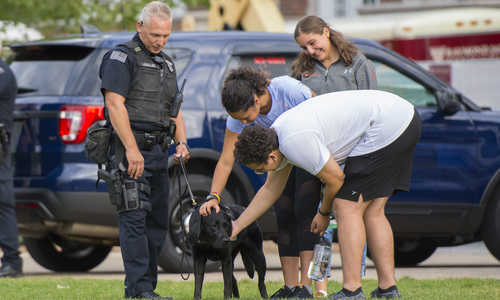
Students greeting Bella with smiles and ear scratches
“This is a dog who has learned incredible detection skills and has inherent comfort skills,” says Marsh.
Over the years Lavallee has enjoyed watching students get to know and appreciate Bella. “Sometimes someone comes up to me and says, ‘I’m having a bad day. Can I pet Bella?’” he says. “Or someone will sit on the floor four feet away from Bella the first time they meet her, and then the next time we meet, they’re sitting right next to Bella, leaning on her.”
Don’t be fooled, though, into thinking that Bella—or Lavallee—has an easy job. They train together twice a day, every day, including weekends, holidays, and vacations (see video below). Even when Lavallee had COVID, he set up training scenarios for Bella in his basement, where he quarantined from his family. Those daily training sessions keep Bella sharp. They’re also how she receives all of her kibble.
Lavallee hides small training aids containing scents that mimic different explosives, such as smokeless powder and shell casings. When Bella smells the odor, she sits to alert Lavallee that she found something. Each alert earns her several pieces of dog food. “The idea is to associate that explosive smell with the reward,” he says. “When I’m wearing the food pouch, Bella wants to work because she wants to get what’s in the pouch.”
